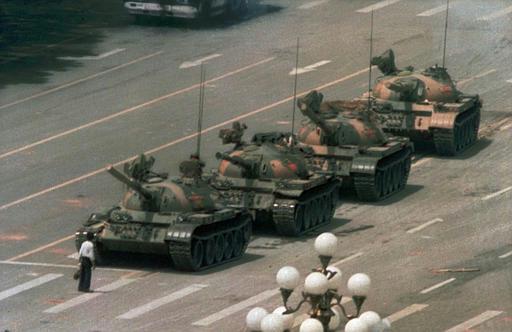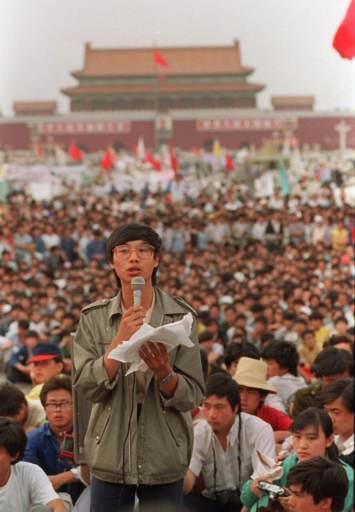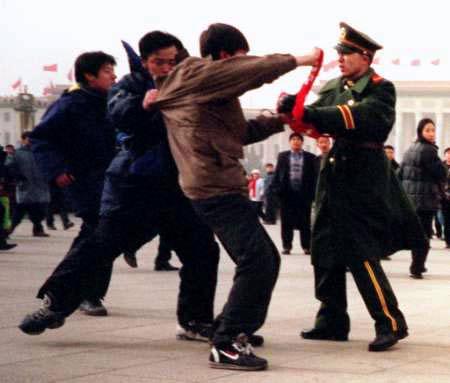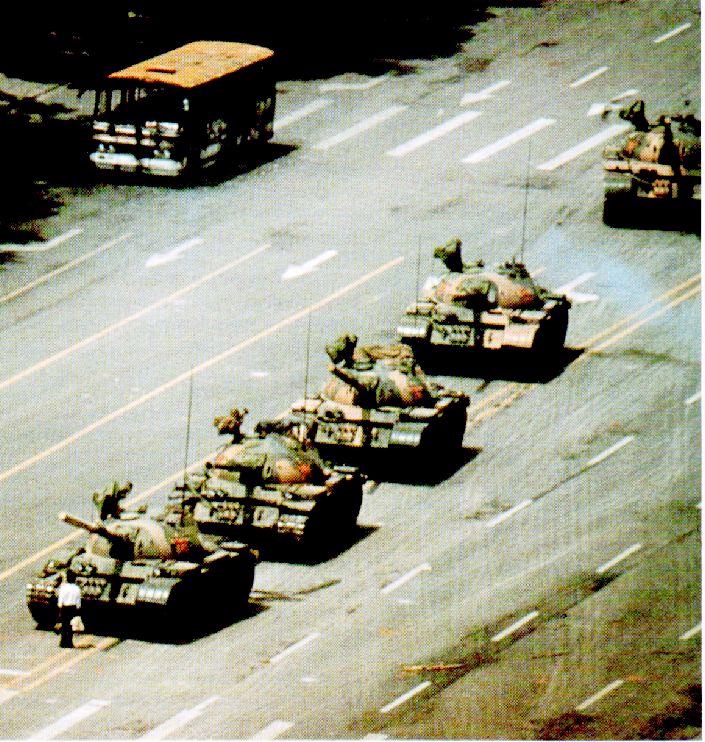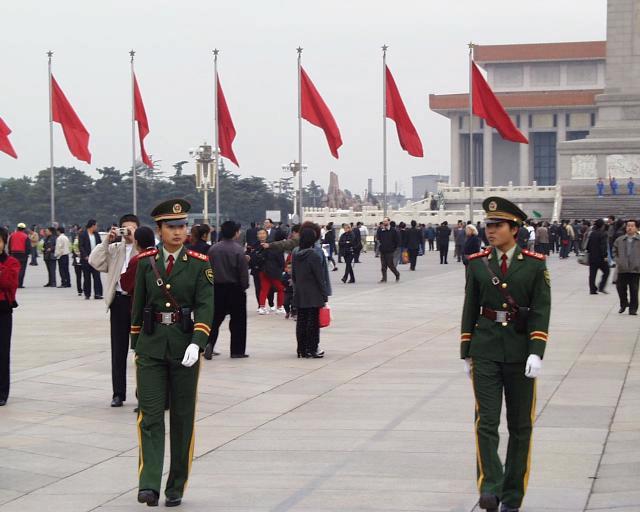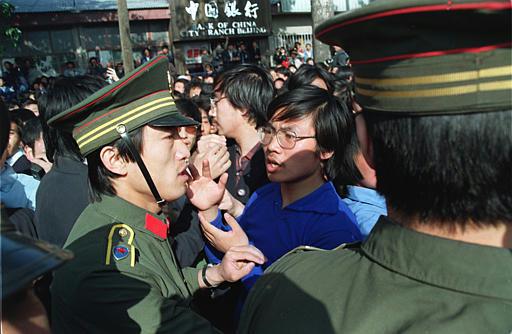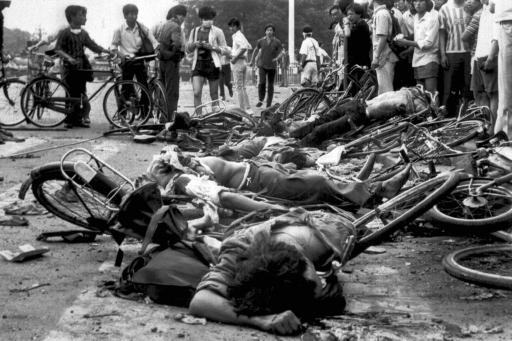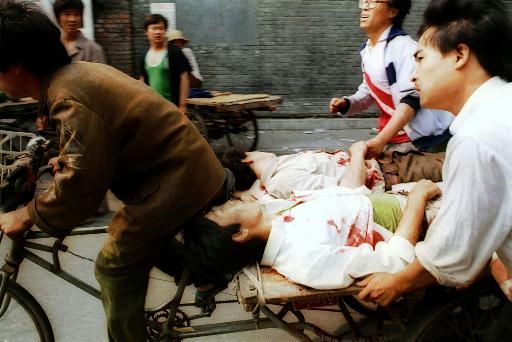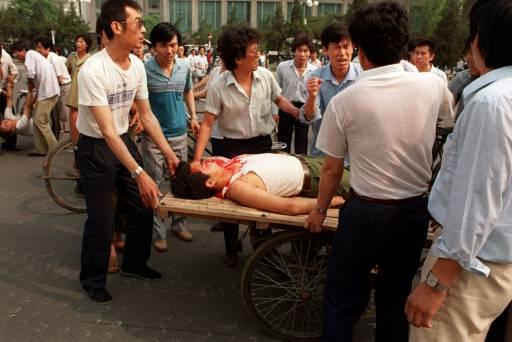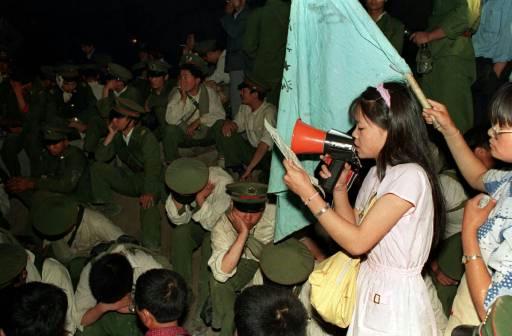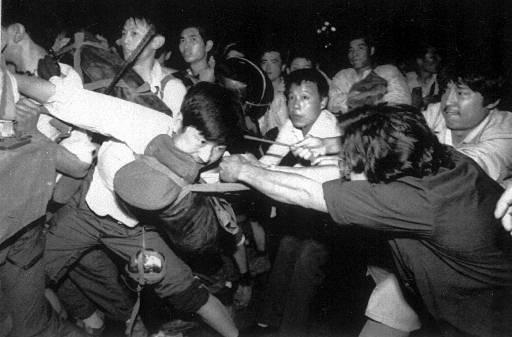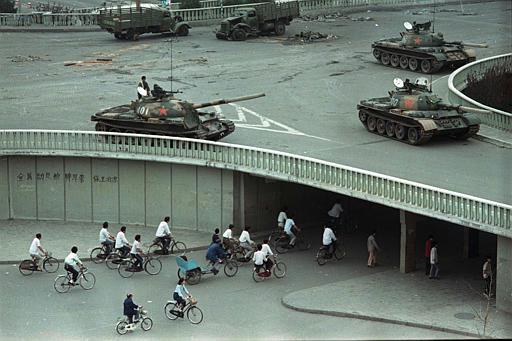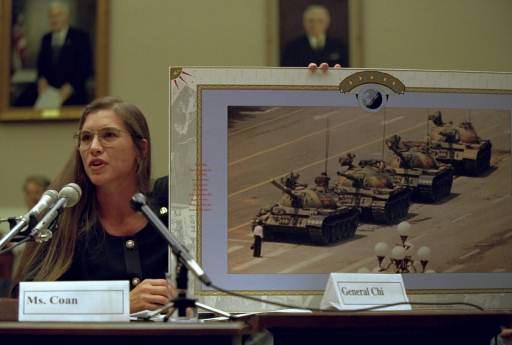|
|
|||||||||||||||||||||||||||||||
|
China's Tiananmen Square Massacre
The Suppression of DemocracyIn June 1989 the Communist Party of China sent the army and tanks to disperse a crowd of peaceful protestors in Tiananmen Square. The army, urged on by party hard-liners, tortured and killed approx. 7,000 to 10,000 civilians. It is one of the most bloody massacres in world history. The protest started as a public mourning for Hu Yaobang (who died of heart attack April 15th 1989), the General Secretary who was forced to resign because he advocated freedom of speech and freedom of press in 1986. The large public mourning on April 16th 1989 attracted the attention of pro-democracy students and grew in size rapidly. By April 21st approx. 100,000 students had converged on Tiananmen Square to protest government corruption and nepotism and were calling on other universities and people across the nation to join the protest.
More than a thousand students even started a hunger strike and students/workers from more than 400 other cities began to hold similar protests. Within the Communist Party rumours were flying that it was only a matter of time before the protestors turned violent, military coup or even civil war if the pro-democracy movement managed to organize itself. China's leader Deng Xiaoping, who ruled China from a military post and other members of the Communist Party followed his orders decided to brutally suppress the protest to send a signal that China would remain under strict communist control. Democracy would not be tolerated and Deng viewed the protests as a threat to his regime and the perseverance of communism in China. Deng later retired in 1992 due to the party backlash from the massacre and waning support. In Hong Kong (then controlled by Great Britain) 300,000 people held a sympathy protest at the Happy Valley Racecourse on May 27th 1989. A day later 1.5 million people (one quarter of Hong Kong's population) paraded through Hong King island in support of democracy. Other smaller protests were held in Chinese communities around the world. In addition to the violence Communist Party supporters of the protest were placed under house arrest, other protests in China were cracked down on, foreign press was banned from China or forced to leave, and there was strictly controlled media coverage in order to downplay the "incident" as mere school boy hooliganism.
On May 20th China declared martial law, but due to the throngs of protestors the military was unable to enter Beijing and ordered to withdraw for the time being. By this point the hunger strike had reached its 3rd week and the government chose to take violent military action to end the hunger strike, causing a schism within the Communist Party. General Secretary Zhao Ziyang was ousted for being an useless figurehead and democracy sympathizer. Even members of the military were unwilling to participate in a crackdown on the protestors and party leaders had to find military leaders willing to take violent action. Entry of the troops into the city was actively opposed by many citizens of Beijing. Protesters burned public buses and used them as roadblocks to stop the military's progress. The battle continued on the streets surrounding the Square, with protesters repeatedly advancing toward the People's Liberation Army (PLA) and constructing barricades with vehicles, while the PLA attempted to clear the streets using tear gas, rifles, and tanks.
The suppression of the protest was immortalized in Western media by the famous video footage and photographs of a lone man in a white shirt standing in front of a column of tanks which were attempting to drive out of Tiananmen Square. Taken on June 5 as the column approached an intersection on the Avenue of Eternal Peace, the footage depicted the unarmed man standing in the center of the street, halting the tanks' progress. As the tank driver attempted to go around him, the "tank man" moved into the tank's path. He continued to stand defiantly in front of the tanks for some time, then climbed up onto the turret of the lead tank to speak to the soldiers inside. He reportedly said, "Why are you here? You have caused nothing but misery." After returning to his position blocking the tanks, the man was pulled aside by onlookers who perhaps feared he would be shot or run over. The violent suppression of the Tiananmen Square protest caused widespread international condemnation, but otherwise did almost nothing about it. George Bush Sr. announced trade sanctions against China, but they were later removed.
Years after the Tiananmen Square MassacreBlood still stains the stones of Tiananmen Square. Years after Chinese tanks crushed the student-led pro-democracy movement in Tiananmen Square, students are being cast as central characters in a political battle over information. They are both the main beneficiaries of an information explosion and a focus of an authoritarian government redoubling its efforts to control the flow of information. Thousands of student protesters were killed when government troops and tanks moved into Tiananmen Square, but in China such information has been forcefully suppressed.
Thanks to China's growth in capitalism and economic strength more students are able to access the internet than ever before, and they're learning about what happened during the June 4th 1989 massacre, which they colloquially refer to now as "6-4." Thanks to a higher rate of English foreigners flooding China there is also a lot more people learning about the massacre which has been ignored in China's history books. Some Chinese, raised on a diet of Communist party propaganda and nationalism, don't believe the information about the massacre, thinking it to be some kind of hoax. But for those who do believe and democracy advocates it's a dangerous challenge to the Communist Party's monopoly over information, many of whom security police have been periodically arrested, intimidated and told to stay silent. Every year people gather at the windswept Tiananmen Square, which sits docked at the mouth of the Forbidden City, and every year a few groups of young people attract the attention of police for trying to post a banner remembering the event in 1989.
To this day high-school history textbooks make only the briefest mention of the killings, which they blame on unruly students poisoned by liberal, capitalist thought from the West, the location of killings is not mentioned, indeed not even the city is mentioned. The government's suppression of information about Tiananmen has been marginally successful: Most Chinese don't know much about Tiananmen Square massacre, and only a few know details. But thanks to the internet age's explosion in communication students can learn a lot more about the topic. In 2009 China is expected to surpass the United States in total number of internet users. Though hundreds of websites related to the Tiananmen massacre are shut down, blocked or filtered, a simple Google search in Chinese will reveal a handful that can still be accessed, including court judgments of protesters and even the famous picture of the man who single-handedly held back a column of tanks.
Some online discussion boards have escaped shutdown. One posting yesterday said the government "treated students the way hunters treat rabbits." Email, instant messaging services and social networking sites are also a new means to exchange information. "If we don't understand it, how can we talk about it? There were deaths, but I don't know how many. I'm not sure who is to blame." said Qu Zuoliang, a student at Beijing University. He was only a child when the massacre took place, and only learned about it a few years ago. Many students, including Qu, have seen a fuzzy video recording allegedly of the battle at Tiananmen that's circulating around China's campuses. But Qu said he doesn't believe it's real. "It probably [is propaganda that] comes from Taiwan or the U.S.," says Qu.
"Now in the international community, a hot word is `human rights'. Even unconsciously, we will relate the (Tiananmen) incident to human rights." said Wang, a student at Beijing's Language and Culture University. "Many friends who go to other countries to study can know information from there, and by MSN or e-mail, tell us," said finance student Du Cheng Ye, 21. Howard Balloch, former Canadian ambassador to Beijing, said China's civil rights are growing, but its a slow process. "There is no question that in every area of human endeavour and engagement, the Chinese are better off and freer and more protected in their rights than probably at any time in their historical past." While many Chinese are content to either ignore the history of the massacre in Tiananmen Square, or don't know much about it, the feeling is much more different in Hong Kong.
Every year tens of thousands of Hong Kong's people waves candles, sings and chants today to commemorate the anniversary of the bloody Tiananmen Square crackdown in Beijing. Beijing shocked and outraged Hong Kong by deploying tanks and troops on June 4th 1989 and killed thousands of people. One million Hong Kong people spontaneously took to the streets in protest, fearful for what lay ahead as they waited for Britain to return Hong Kong to China in 1997. Bitter memories linger, along with admiration for the students who gave their lives in Beijing. "Hong Kong should be democratic," university student Tsui said at an annual vigil that was highly charged as a result of the recent bitter dispute over the territory's political future. "Hong Kong people should be ruling Hong Kong ourselves." In Hong Kong people have grown increasingly frustrated and unhappy with the political situation after the British left and democratic elections for leaders have been partially suspended. Instead half of Hong Kong's leaders will be chosen by the Communist government in Beijing.
Although critics accuse China of stripping away Hong Kong's guaranteed autonomy, Beijing has stressed economic growth for the territory in hopes that it will mute demands for more democracy. Beijing says its troops were needed to break up a counter-revolutionary riot but Hong Kongers believe the real intent was stopping dissent that challenged China's one-party rule.
Many in Hong Kong feel a duty to speak out, because they enjoy free speech rights - unheard of in the authoritarian mainland - under a government arrangement dubbed "one country, two systems" put in place at the handover. Emboldened by the success of the "people power" movement, many began clamouring for universal suffrage, but Beijing has refused to even discuss the idea. "One alone in a Chinese square confronted tanks, while others fled. He stood for freedom for us all, but few care now if he?s jailed or dead." - Jimmy Carter.
|
|
||||||||||||||||||||||||||||||
|
Website Design + SEO by designSEO.ca ~ Owned + Edited by Suzanne MacNevin | |||||||||||||||||||||||||||||||
